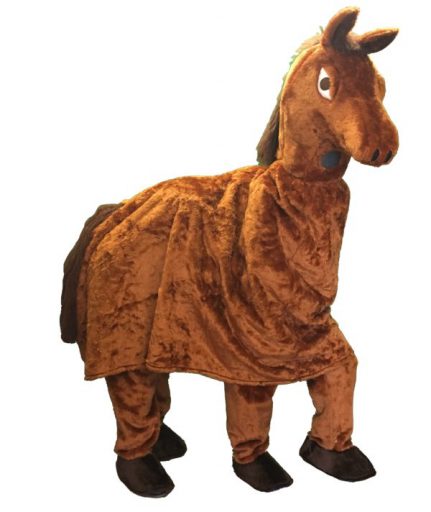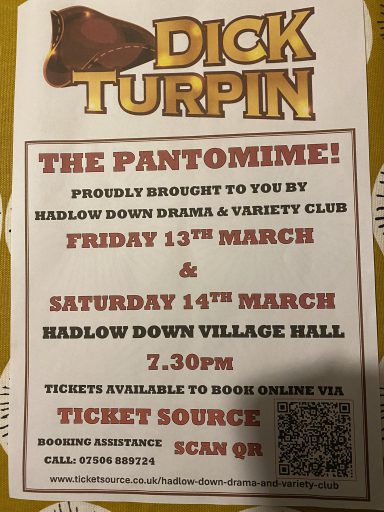If you are on the internet, the parish council would urge you to sign up to the My Wealden Alerts at https://my.wealden.gov.uk/en. You would then be notified via the weekly Wealden update (at the bottom of the email) of any new planning applications in your area. In addition to this the parish council will try its upmost to inform residents of new application as they arrive via its website. However, this does by no means cover the many residents who are not on the internet, so we would please ask everyone to spread the word as new applications are submitted.
Planning notification letters from Wealden DC have stopped
The Pantomime is Back!
After a break of a few years, the famous Hadlow Down Variety & Drama Club Pantomime is returning to the Village Hall — and we’re delighted to welcome it back!
This year’s production is “Dick Turpin”, promising a thoroughly entertaining evening in the grand tradition of panto. Expect plenty of laughs, a fabulous pantomime Dame… and keep an eye out for the pantomime horse!
Dandy highwayman Dick Turpin travels to York pursued by the villainous Judge Mental and his Bow Street Runners, Hand and Cuff.
In York he meets and falls in love with Maggie Micklegate of the Cock and Bull Inn, run by Doris Doolittle and her son Simon.
When Dick reveals he holds a pirate’s treasure map and offers to make them all rich, the adventure truly begins…
Will Judge Mental capture our hero, or will Dick escape once again?
The performances will take place at 7:30pm on 13th & 14th March in the Village Hall.
 The pantomime always sells out, so if you haven’t already booked — do get your tickets soon! £12 for adults and £6.50 for under 16s
The pantomime always sells out, so if you haven’t already booked — do get your tickets soon! £12 for adults and £6.50 for under 16s
Come along and support a wonderful local tradition while enjoying a brilliant night’s entertainment.
Now has anyone seen that pesky horse?
What was that? “Did you say “Behind You!”
Village Associations Annual General Meeting – All Welcome

The Hadlow Down Village Associations — Hadlow Down Village Hall, Hadlow Down Playing Field, Hadlow Down Village Fayre and Hadlow Down Community Centre — warmly invite residents to attend their Annual General Meeting at 7:30pm on 20th February in the Village Hall.
Come along to hear the Chair’s reports for 2025 and find out what has been achieved over the past year, as well as the plans and priorities for the year ahead.
All of these organisations are run by volunteers for the benefit of the whole community. Your support really matters, and the AGM is a great opportunity to learn more about what they do and how you might like to get involved.
Refreshments will be served and there will be time to chat informally afterwards.
We look forward to seeing you there.
New monthly Pop in and Craft sessions in the Village Hall

We’re pleased to share that a new Craft Group has started in the Village Hall — a relaxed and friendly space where everyone is welcome.
The sessions are free to attend, and each month two crafts are demonstrated. If you would like to join in, packs of supplies are provided for you to use during the session or take home and finish later — perfect for beginners as well as experienced crafters.
This month we’ll be making Raggy Dolls and focusing on upcycling projects, giving old fabrics and materials a new life.
The café kitchen will be open from 10:00am, serving brunch, tea and coffee, homemade soup and a roll, hot dogs, and plenty of delicious cakes. Even if crafting isn’t your thing, it’s a lovely place to pop in for a late breakfast or lunch with friends.
All proceeds from the café go directly to support HDCC
Why not pop in this Saturday from 10:00am and see what it’s all about?
For all upcoming dates, please check the calendar here.
🌼 Spring Market – Save the Date
 Pop the date in your diary — our Spring Market will be held in the Village Hall on Saturday 28th March.
Pop the date in your diary — our Spring Market will be held in the Village Hall on Saturday 28th March.
Please do come along and join us for a relaxed morning in good company. There will be a wonderful selection of local businesses, home produce, jams and handmade crafts, perfect for a browse or to pick up something special.
It’s also a great chance to catch up with friends and neighbours over a cuppa — with cakes and hot snacks available to keep you going.
The Spring Lottery will be drawn during the event… could you be our next winner?
Best of all, every purchase and every visit helps support our fundraising efforts to build a new Village Hall at the Playing Field. Your support really does make a difference.
We look forward to seeing you there!
Agenda for Community Centre Advisory Committee 10th February 2026
Notifications to be discussed at 3rd February 2026 HDPC meeting
WD/2026/0039/FA for CRISPHAMS COTTAGE, ROSERS COMMON, BUXTED, TN22 4QA
Variation of conditions 2, 3 and 11 of WD/2025/1711/f (erection of extensions, alterations, demolition and replacement of a garage and associated development) variation of materials.
Link to documents: Planning Register – Wealden District Council
WD/2026/0113/F and WD/2026/0114/LB for STABLE COTTAGE, HUT LANE, HADLOW DOWN, TN22 4HD
Internal and external alterations to the existing dwelling, including the excavation of a basement to provide additional rooms, and relocate the swing gate to hut lane entrance.
Link to documents: Planning Register – Wealden District Council
Agenda & reports for HDPC meeting 3rd February 2026
Governance Documents 2026
Burial Ground – Fees and Regulations 2026
Notifications to be discussed at 13th January 2026 HDPC meeting
WD/2025/2857/LDP for CRISPHAMS COTTAGE, ROSERS COMMON, BUXTED, TN22 4QA
Proposed outbuilding for hobbies use.
Link to documents: Planning Register – Wealden District Council


